- Home
- Harry Harrison
Stars and Stripes In Peril sas-2 Page 4
Stars and Stripes In Peril sas-2 Read online
Page 4
He took a deep breath and bowed in the direction of the royal viewing box.
“I now surrender this ship to the able and noble hands of Her Majesty the Queen.”
There was a murmur through the crowd as the last of his speech was made; a flutter of applause from the stand where the silk-hatted and bonneted gentry sat. Stretched out on both sides were the crowds of flat-capped workers who had built this behemoth. Now there was louder applause, and some shouts of approval, as the tiny black-garbed figure stepped forward to the rail.
Queen Victoria looked at the massive iron bow before her and nodded approval. The Duke of Cambridge, Commander-in-Chief of the British Army, was at her side. Splendid in his dress uniform, chest twinkling with medals, great ostrich plumes adorning his lustrous hat. One of his aides passed him the magnum of champagne that hung from the line secured to the jackstaff on the bow of the ship above. The sound of sledge hammers on wood sounded below as the first restraining baulks were hammered free.
“Now,” the duke said passing the bottle to the Queen. She took it in both her tiny, gloved hands, raised it as her thin voice cut through the sudden silence.
“I christen thee Conqueror. God bless this ship and all who sail on her.”
“Do it!” the duke whispered urgently. The Queen was his cousin so he did not bother to mince words. The last restraints clattered free and the great iron ship shuddered and began, ever so slowly, to move.
Victoria pushed the bottle out. It swung in a slow arc and hit the bow.
And bounced back without breaking. There was gasp from the watching crowd.
This had happened more than once before and provision had been made; a thin line had been attached to the launching rope to pull it back. One of the firm’s directors pulled on it hurriedly as Conqueror started down the greased ways. There was a grumbling roar as the great mass of piled chain secured to the ship’s bow to slow the launch moved ponderously after her.
Cursing under his breath the Duke of Cambridge seized the bottle himself and threw it in a mighty overhand swing — just as it was torn from his hands. This time it crashed into smithereens and the wine ran down the riveted iron. The crowd burst into a spontaneous roar of approval as Conqueror slid foaming into the still waters of the Victoria Channel. Rocked ponderously in the roiled waters.
Queen Victoria turned away well before the ship was clear of the slipway.
“We are chilled,” she said as the officials backed quickly aside to make way for her. The Duke of Cambridge walked at her side, then joined her when she climbed into the waiting carriage.
“A day’s work well done,” he said when the door was closed. He did not mention the near-fiasco of the bottle, not seeing any point in prompting one of her tantrums. “And the first of many to come. Six more iron ships under construction, though none to match this one. In Liverpool and Glasgow even now they are fitting out these ships of the new navy. We go from strength to strength…”
“Pull up that rug. We are cold.” Her tiny, bejeweled hands tugged at the edge of the rug, drew it up to her chin. “And what of this invasion you keep telling us about? What of this strike to the Yankee heartland that will bring them to heel?” Her voice was high-pitched and querulous.
“ Rome was not built in a day, dear cuz. We are assembling an army and that takes time. Our landings on the Pacific coast of Mexico were unopposed and successful. Troops have been landed, an army assembled. Even as we speak a road is being cut through the trackless jungle there. We must be patient. It takes time to prepare all that is necessary for a war, you know. This will take even more time for the land is savage and wild. But you must realize that this only the beginning. A fighting fleet must be assembled as well, transports assembled, the stuff of war manufactured. And we must be most cautious and balance our troop movements carefully. At the same time that we strip India and the Orient of native troops, we must replace them with English yeomanry. A matter of necessity you will surely concede. It was agreed by the Cabinet, for all the most obvious reasons, that since the Indian Mutiny a certain number of British troops must always serve there. With Indian troops in Mexico we can lower our guard a bit, station fewer of our own troops there perhaps, but we must be ever vigilant. So, all things considered, I can truthfully say that everything has been done that can be done.”
“We don’t like waiting,” she said. Pouting, querulous. “You said that no country can make a mockery of the British Empire — nor could one stand against its might. We want to see this happen — do you understand? We have the ghastly feeling that my darling Albert will never sleep at peace until this is done.” She twisted her black kerchief in her hands, unaware that she was rolling and unrolling it. She stared unseeingly into the distance, her wrinkled frown deepened. “I dream of him, almost nightly. Looking as he did — so many years ago. How handsome he was! But he does not appear to see me in my dreams. It is so awful. I try to talk to him — but I cannot find the words. He looks so unhappy with downcast eyes and a most somber mien. It is these Americans, I know it! They killed him and now they laugh at us.” Her voice shrill and angry. “They laugh — thinking that they can defeat the might of the British Empire. Something must be done to bring them to heel!”
There was no answer to that. The Duke muttered some pleasantries, then turned on the seat to look out of the window. When he did he felt something rustle in his breast pocket. That’s right — he remembered now — an aide had given him a message just before the ceremony. He dug the paper out and read it quickly.
“Damn and blast,” he muttered.
“What is it?” Victoria asked, frowning. She had an aversion to strong language. He waved the paper.
“That Home Office clerk they arrested, the one who seemed to come into money so suddenly. Weeks was his name.”
“What about him?”
“He talked. Confessed. I imagine they had to use a bit of persuasion, which I am sure that he richly deserved. Turns out that he really was a traitor, a damn spy, selling Britain’s most vital secrets to the Yankees. Goodness knows what he told them. Traitor. And he wasn’t even Irish. That I would have believed. Indeed.”
“An Englishman. We find that hard to give credence to. What will they do with him? Is there to be a trial?”
“No need to wash our dirty linen in public. In fact it has already been done. A self-confessed spy made for a speedy trial. Found guilty. Hung him next to the traitor’s gate. Buried him in the tower. Should have been drawn and quartered first.” He crumpled the paper and threw it onto the floor.
There were crowds in the street outside to see the Queen go by, since she rarely came to Ireland. Urchins ran beside the carriage and cheered wildly, as did the onlookers.
The carriage, and its squadron of mounted guards, turned a corner and passed now through a meaner neighborhood of narrow streets. Rubbish littered the broken pavements here, spilled over into the gutters. There were no cheers to be heard here, even a few backs were turned as shawled women walked away from the carriage and the soldiers. The Queen was too filled with sorrow for her departed Albert to notice. Not so the Duke who, like many of his class, rather detested Ireland and her peoples.
“Filthy Catholics,” he muttered to himself. Pulled his hat low on his forehead and stared angrily ahead.
Across the width of the Atlantic Ocean lay Washington City, once again the capital of a land at peace. For the moment. Dark clouds were forming on the horizon and the future was not clear, not clear at all.
“You are of a much sorrowful aspect,” Abraham Lincoln said when Judah P. Benjamin was ushered into his office. The portly Southerner nodded silent agreement, his jowls wobbling. He dropped heavily into a chair but did not speak until John Nicolay, Lincoln’s secretary, had left, closing the door behind him.
“I am beset by troubles, sir, burdened by sorrows. It seems that when I lay down one encumbrance I pick two more up. Changing an entire society and how it thinks and works is no easy thing. This process of change —
what shall we call it?”
“Reconstruction?” Lincoln suggested.
“Not quite — because nothing has been torn down to rebuild. I think ‘reformation’ is more accurate. We are reforming a whole society and no one seems to like it. The Freedman’s Bureau is still a shell, filled with volunteers who wish to do good for the former slaves. The freed slaves are unhappy because freedom does not seem to have changed their situation. But for everyone that wishes them well, there are a dozen who wish to impede all progress. Mississippi planters are still seeking larger payments for freeing their slaves. And when those slaves who are freed seek work in the plantations, why, they are offered financial remuneration at a starvation level. The only ray of hope in the entire process is the working classes. Soldiers who return from the war are finding jobs rebuilding the railroads, as well as in the new industries that we are founding. They are paid hard cash for their labors and that helps the economy at large. But even there we find dissension. When freed Negroes seek work in these factories the white employees often refuse to work beside them. The planters are displeased at anything and everything we do and they fight us at every turn. Even the small farmers grow angry when they discover that land has been purchased for freed slaves… I hesitate to go on.”
“No bright ray of hope in all of this night of misery?”
“Yes, some, of course. I have been diverting funds from the Freedmen’s Bureau to the Negro churches and mutual benefit societies. They are our salvation. They are already respected among the Negro community and able to funnel aid and monies to individuals in need. Yet with all the organizations working on our side — I see a darker force being assembled. We must never forget that slavery has always been a central institution in Southern life. It has been simultaneously a system of labor, a form of race relations, and the foundation of a distinctive regional ruling class. Men who see themselves as the pinnacles of society feel that their position is threatened. They feel themselves marginalized in the new South — which is true. As money moves from the land to the factories a different elite is being born. And the planters do not like it. Therefore it is not surprising that there are men of violence who wish no change in the South. As well as others who accuse us of putting the black man before the white. I am possessed of a great fear.”
“You must be strong, Judah. All of us must. But you most of all because you have picked up this immense burden. Nothing of this sort has ever been done before, no society has labored so to change the way things are done. Neither let us be slandered from our duty by false accusations against us, nor frightened from it by menaces of destruction to the government, nor of dungeons to ourselves. Let us have faith that right makes might, and in that faith let us to the end dare to do our duty as we understand it.”
“I pray I have that strength, Mr. President, for at times I am terribly tired. It is the hatred of my fellow Southerners that wounds the most. Men I have known for years, who behind my back call me traitor.”
There was little that Lincoln could answer to that. He went through the records that Benjamin passed over to him, and on paper there seemed to be progress. Slaves freed, payments made — to former slave holders and demobilized soldiers.
“You are doing well, very well indeed,” Lincoln said, arranging the reports into a smooth pile. There was a light tap on the door before Nicolay came in.
“Mr. President — you wanted to know when Mr. Mill arrived. He is here now, and his daughter is with him as well.”
“Even better. He has talked much of her. Show them in.” He turned to Benjamin. “I’m most glad that you were here when he arrived. When spirits lag Mill can be of great support.”
They both rose when John Stuart Mill entered with his daughter.
“President Lincoln, and Mr. Benjamin, may I present my daughter Helen.”
Helen was a plain girl, wearing simple clothing. Yet she had the same sparkle of curiosity in her eyes as her father. A warm smile touched her lips as she gave a slight curtsy.
“Your father has spoken of you in most glowing terms,” Lincoln said. “Both as an inspiration and an aide in his works.”
“Father is too kind, Mr. President. He is the genius in the family.”
“Who would be that less of a genius,” Mill protested, “had it not been for the tireless support of you and your dear mother.”
“I must thank you both,” Benjamin said, “for your aid and advice when this country was in dire need. If your plans are followed we will have a new country — and particularly a new South that will be born out of the wreckage of the old.”
“Not my plans, Mr. Benjamin. I have just pointed out and explained some economic truths. Science evolves as man evolves. We must build on the past. Ricardo was a great man and his economic theories led philosophers, including myself, onto the path to greater knowledge.”
“My father is being too modest,” Helen said. “The followers of Ricardo had rigidified his objective findings into a straitjacket for society. When he wrote his famous book, The Principles of Political Economy and Taxation, he formulated certain rules that his followers have treated with almost holy respect. They believed without questioning his laws which he said regulate the distribution, between the different classes of landowners, capitalists and labor, of the produce of industry. My father was one of the very few who did not take Ricardo’s laws as holy writ. What my father said was transparently obvious — once it had been said. He said that it doesn’t matter if what they called the natural action of society was to depress wages, equalize profits or even raise rents. It was only natural if people believed that it was natural.”
Mill smiled and nodded agreement. “I’m afraid that, as always, my daughter has cut to the core of the problem. Though I am a bit more humble as I stand in the shadow of a great man. Without Ricardo to build upon I could never have seen the correct path that we must follow. If society does not like the “natural” results of its activities it has only to change. Society can really do anything that it desires. Society can tax and subsidize, it could give all of its wealth to the President to spend as he willed. Or it can run a gigantic charity ward. But whatever it does there is no correct distribution, or at least none that economics has any claim to fathom. And that process is what is happening in the South. An almost completely agrarian society is being turned into a modern industrial society. Railroads need factories which need coal and iron — and all of them need workers. These workers receive wages which they in turn pay for products, so the economy thrives. There is nothing natural or inevitable about how a society develops. Changing moral values can drive a society to new heights of success.”
Judah P. Benjamin smiled wryly and shook his head. “And there, as the bard said, is the rub. Too many in the South do not want to change their moral values and they yearn for the old and simplistic values, with the few governing the many and the Negro at the very bottom, enslaved and helpless.”
Mill nodded, then sighed. “You are indeed correct, sir. But as physical values are changed, you will find that moral values change with them. A man freed from slavery will fight to keep that freedom. A man receiving a decent wage will not go back to penury without a battle. You are going through the period of transition now and I do not envy you your labors — or those of the Freedmen’s Bureau. Your reformation will be a painful one for some. But as the majority who enjoys its benefits grows larger you will find that the minority will be forced to join the others.”
“I pray that you are right, sir. Pray to God that this country will survive the strife and change and emerge triumphant, strong and united.”
“A prayer we all share,” Lincoln said, the strength of conviction in his voice.
Shortly thereafter Mill made his apologies and he and his daughter left. Benjamin stood then as well and gathered up his papers. “I have taken up too much of your time,” he said.
“Quite the opposite,” Lincoln said. “We are in this battle together and must stand united. But tell me — what of Jeffers
on Davis?”
“His bullet wound has almost healed, and the doctor says that the worst is past. Of course he has lost a good deal of weight and is very weak. But the doctor tells me that he improves daily. He now walks from the bedroom to the parlor where he sits up part of the day. And his morale seems much better. When the weather improves he hopes to be fit enough to ride again. He was always the great one for riding and misses it sorely.”
“That is the very best news. When you see him next give him my very fondest regards and my sincere hopes for a speedy recovery.”
“I shall do that, sir, I certainly shall.”
“Tell him also how well your work is going. That you are creating the new South — and all of us are cheered by the expansion and advances made in this new United States that he worked so hard to found.”
Cheered somewhat by the President’s encouragement, Judah P. Benjamin walked the few blocks to the house he was renting while he was in Washington City. It was growing dark and the first lamps were being lit. When he turned the corner into his street he saw a small crowd ahead. They appeared to be in front of his house, of all things. One of them seemed to be holding a flickering torch, or at least it looked that way. Benjamin pushed through the crowd of onlookers and stopped. No torch this.

 Arm of the Law
Arm of the Law The Velvet Glove
The Velvet Glove The K-Factor
The K-Factor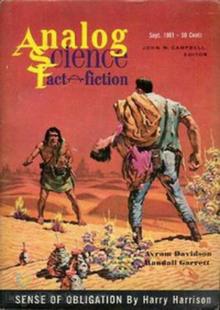 Sense of Obligation
Sense of Obligation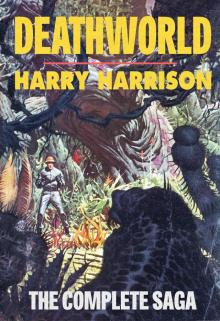 Deathworld: The Complete Saga
Deathworld: The Complete Saga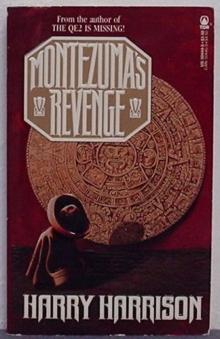 Montezuma's Revenge
Montezuma's Revenge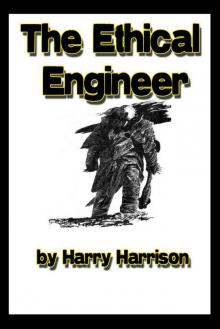 The Ethical Engineer
The Ethical Engineer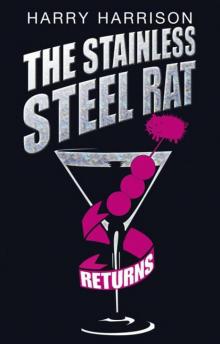 The Stainless Steel Rat Returns
The Stainless Steel Rat Returns The Misplaced Battleship
The Misplaced Battleship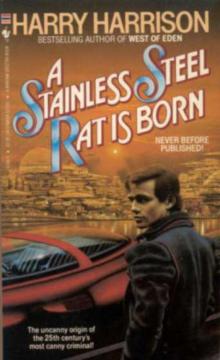 The Stainless Steel Rat is Born
The Stainless Steel Rat is Born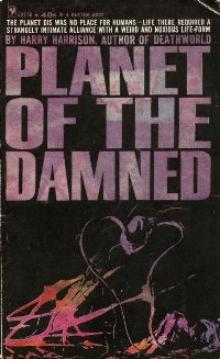 Planet of the Damned bb-1
Planet of the Damned bb-1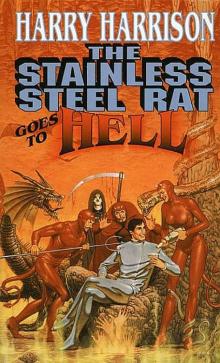 The Stainless Steel Rat Goes to Hell ssr-10
The Stainless Steel Rat Goes to Hell ssr-10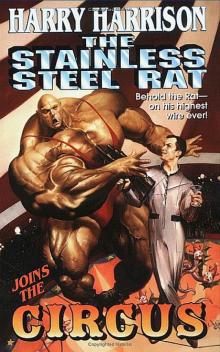 The Stainless Steel Rat Joins the Circus ssr-11
The Stainless Steel Rat Joins the Circus ssr-11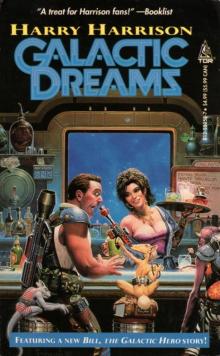 Galactic Dreams
Galactic Dreams The Harry Harrison Megapack
The Harry Harrison Megapack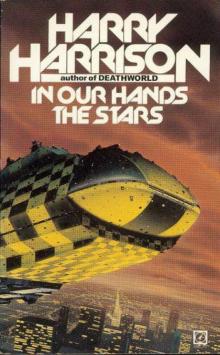 In Our Hands the Stars
In Our Hands the Stars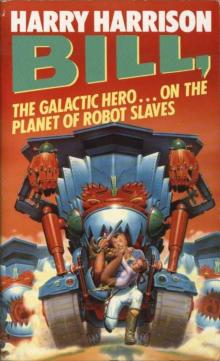 On the Planet of Robot Slaves
On the Planet of Robot Slaves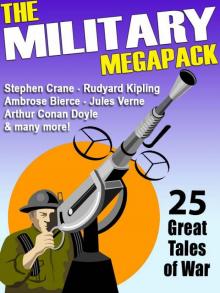 The Military Megapack
The Military Megapack Make Room! Make Room!
Make Room! Make Room!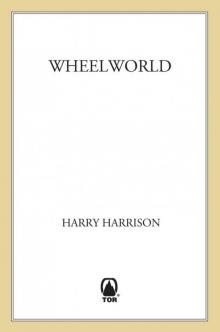 Wheelworld
Wheelworld Winter in Eden e-2
Winter in Eden e-2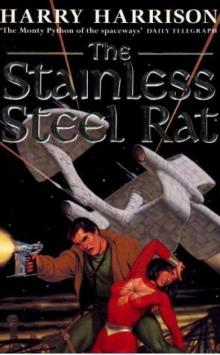 The Stainless Steel Rat
The Stainless Steel Rat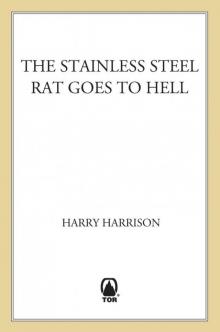 The Stainless Steel Rat Goes to Hell
The Stainless Steel Rat Goes to Hell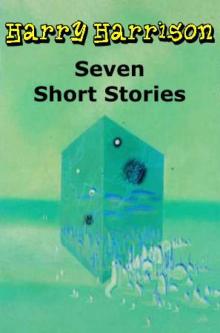 Harry Harrison Short Stoies
Harry Harrison Short Stoies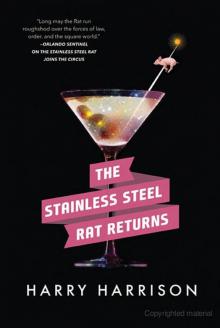 Stainless Steel Rat 11: The Stainless Steel Rat Returns
Stainless Steel Rat 11: The Stainless Steel Rat Returns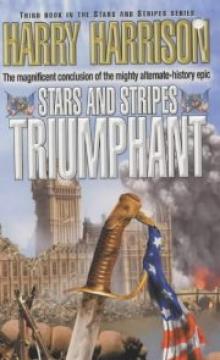 Stars and Stripes Triumphant sas-3
Stars and Stripes Triumphant sas-3 West of Eden
West of Eden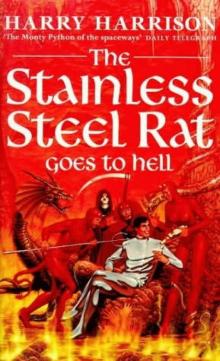 The Stainless Steel Rat Go's To Hell
The Stainless Steel Rat Go's To Hell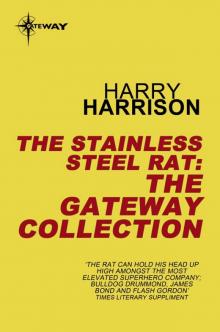 The Stainless Steel Rat eBook Collection
The Stainless Steel Rat eBook Collection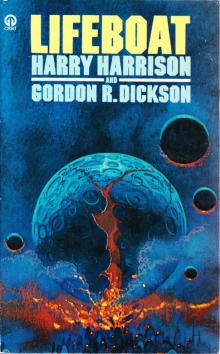 Lifeboat
Lifeboat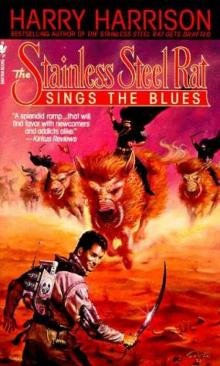 The Stainless Steel Rat Sings the Blues
The Stainless Steel Rat Sings the Blues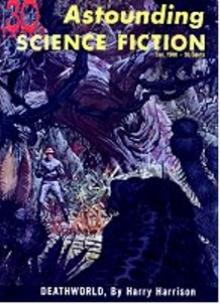 Deathworld tds-1
Deathworld tds-1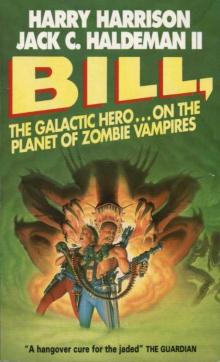 On the Planet of Zombie Vampires
On the Planet of Zombie Vampires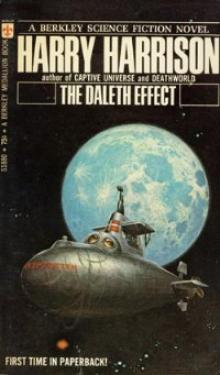 The Daleth Effect
The Daleth Effect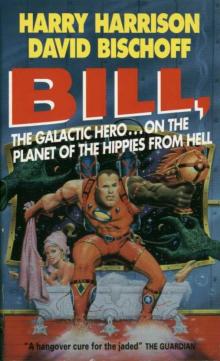 On The Planet Of The Hippies From Hell
On The Planet Of The Hippies From Hell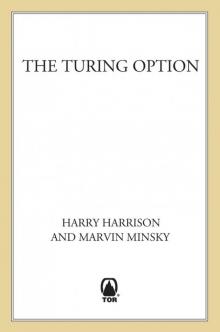 The Turing Option
The Turing Option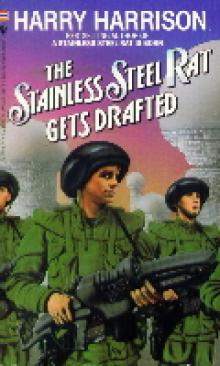 The Stainless Steel Rat Gets Drafted
The Stainless Steel Rat Gets Drafted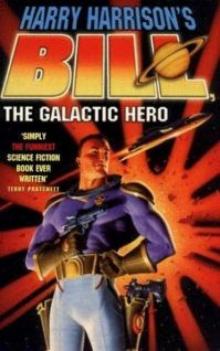 Bill, the Galactic Hero btgh-1
Bill, the Galactic Hero btgh-1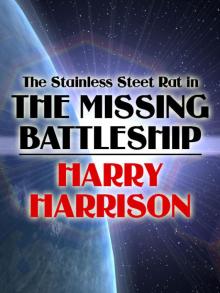 The Stainless Steel Rat in The Missing Battleship
The Stainless Steel Rat in The Missing Battleship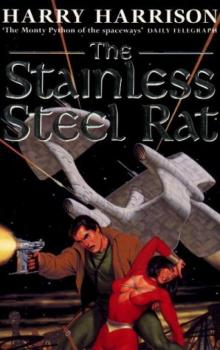 The Stainless Steel Rat ssr-1
The Stainless Steel Rat ssr-1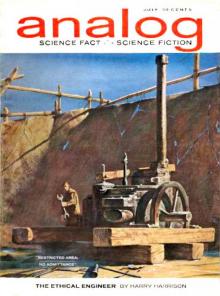 The Ethical Engineer (the deathworld series)
The Ethical Engineer (the deathworld series)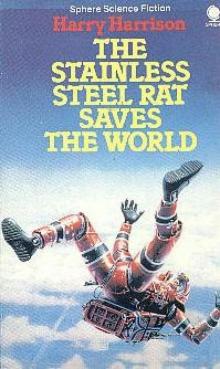 The Stainless Steel Rat Saves the World ssr-3
The Stainless Steel Rat Saves the World ssr-3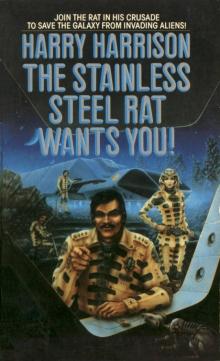 The Stainless Steel Rat Wants You
The Stainless Steel Rat Wants You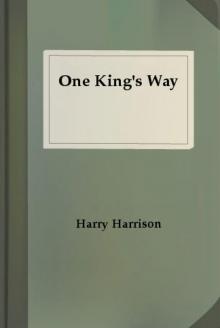 One King's Way thatc-2
One King's Way thatc-2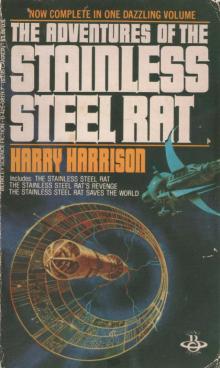 The Stainless Steel Rat Saves The World
The Stainless Steel Rat Saves The World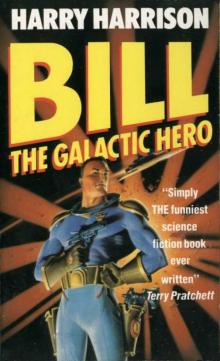 Bill, the Galactic Hero
Bill, the Galactic Hero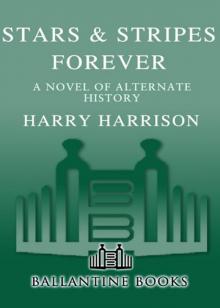 Stars & Stripes Forever
Stars & Stripes Forever Stars and Stripes In Peril sas-2
Stars and Stripes In Peril sas-2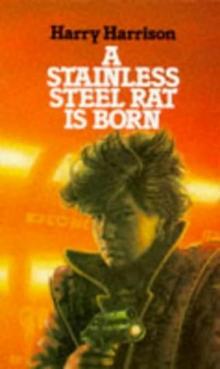 A Stainless Steel Rat Is Born ssr-6
A Stainless Steel Rat Is Born ssr-6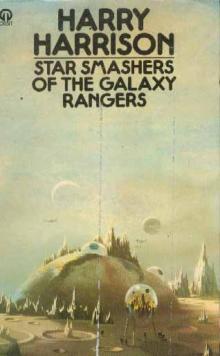 Star Smashers of the Galaxy Rangers
Star Smashers of the Galaxy Rangers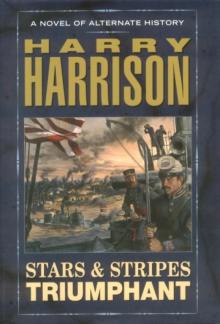 Stars & Stripes Triumphant
Stars & Stripes Triumphant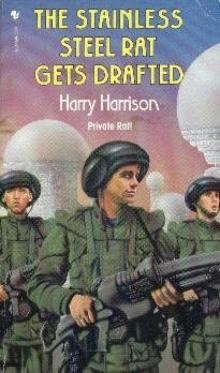 The Stainless Steel Rat Gets Drafted ssr-7
The Stainless Steel Rat Gets Drafted ssr-7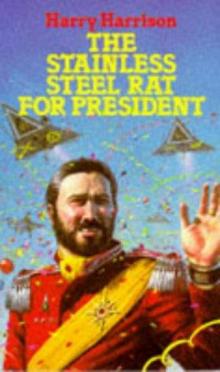 The Stainless Steel Rat for President ssr-5
The Stainless Steel Rat for President ssr-5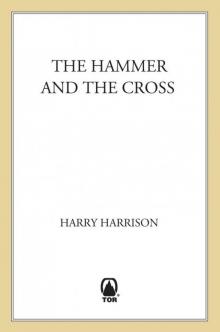 The Hammer & the Cross
The Hammer & the Cross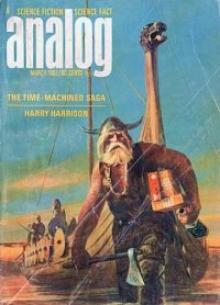 The Technicolor Time Machine
The Technicolor Time Machine The Hammer and The Cross thatc-1
The Hammer and The Cross thatc-1 King and Emperor thatc-3
King and Emperor thatc-3 Return to Eden
Return to Eden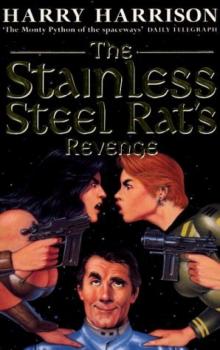 The Stainless Steel Rat’s Revenge ssr-2
The Stainless Steel Rat’s Revenge ssr-2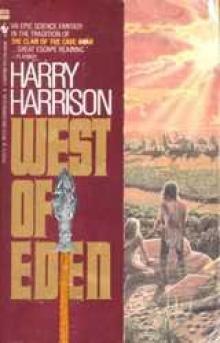 West of Eden e-1
West of Eden e-1 Return to Eden e-3
Return to Eden e-3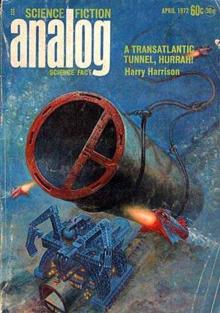 A Transatlantic Tunnel, Hurrah!
A Transatlantic Tunnel, Hurrah!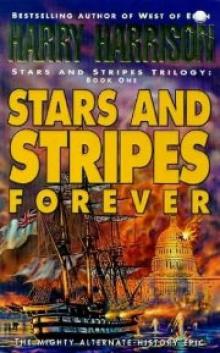 Stars and Stripes Forever sas-1
Stars and Stripes Forever sas-1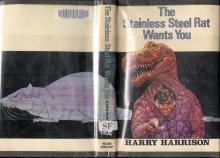 The Stainless Steel Rat Wants You ssr-4
The Stainless Steel Rat Wants You ssr-4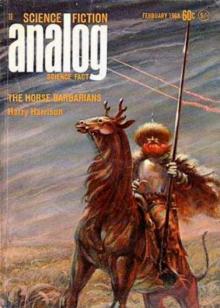 The Horse Barbarians tds-3
The Horse Barbarians tds-3 Planet of the Damned and Other Stories: A Science Fiction Anthology (Five Books in One Volume!)
Planet of the Damned and Other Stories: A Science Fiction Anthology (Five Books in One Volume!)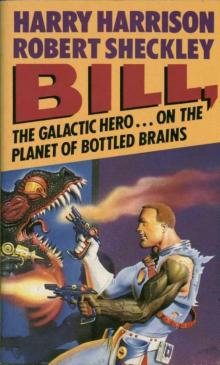 On the Planet of Bottled Brains
On the Planet of Bottled Brains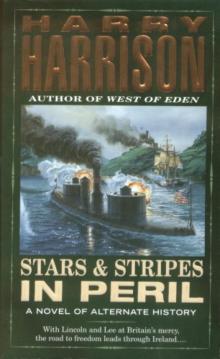 Stars And Stripes In Peril
Stars And Stripes In Peril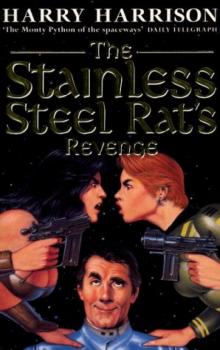 The Stainless Steel Rat's Revenge
The Stainless Steel Rat's Revenge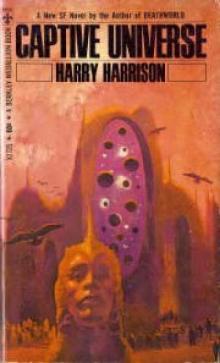 Captive Universe
Captive Universe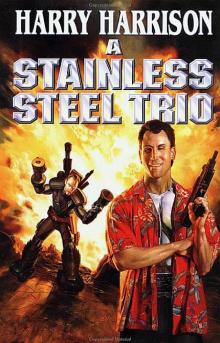 The Stainless Steell Rat Sings the Blues ssr-8
The Stainless Steell Rat Sings the Blues ssr-8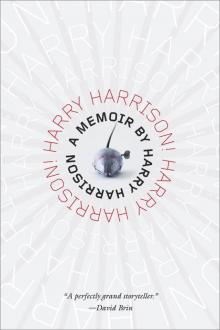 Harry Harrison! Harry Harrison!
Harry Harrison! Harry Harrison! Winter in Eden
Winter in Eden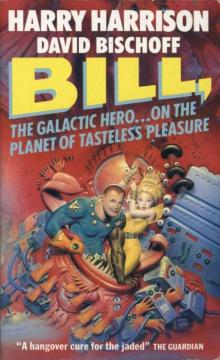 On the Planet of Tasteless Pleasures
On the Planet of Tasteless Pleasures